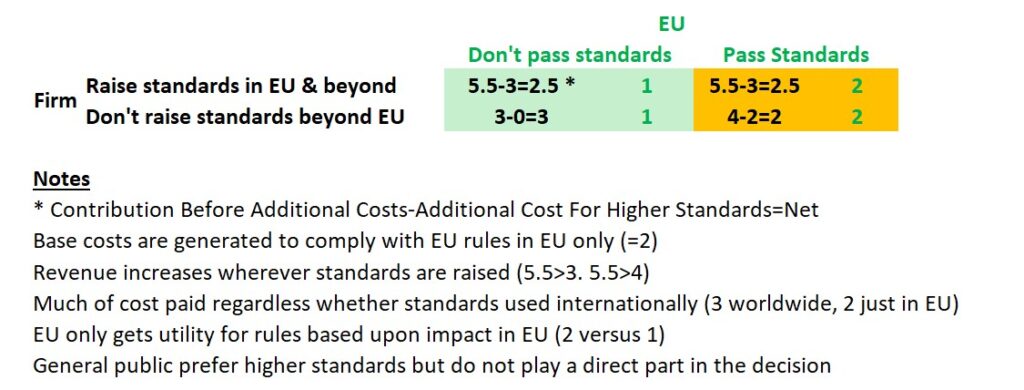The Brussels Effect is a phenomenon whereby regulations created by the EU (European Union) become global standards. A key point is that this is something that the EU can do on its own. It isn’t about expanding regulation through multilateral treaties whereby Brussels attempts to get other states to adopt the EU rules. Instead, the EU acts in ways that suit its tastes and then the world follows.
The Brussels Effect refers to the EU’s unilateral power to regulate global markets.
Bradford (2020) page xiv
The Brussels Effect
The Brussels Effect is about EU regulation having a major impact on world markets. This can happen in a number of ways. De jure (through law) where other countries actively copy the EU’s legal approach. This is simple to do, partly because the EU publishes law in a number of languages, is clear in its rulemaking, and tends to describe in significant detail its regulatory plans.
In many ways, the most interesting is the de facto (in practice) effect whereby market forces encourage firms to adopt EU rules internationally. Here the market drives the effect. It is firms, rather than lawmakers, who decide to adopt the EU rules internationally.
Why Might This Happen?
It is reasonable to ask why this might happen. Often managers say they don’t want regulations and the EU tends to have the strictest rules. Why would firms then voluntarily adopt the strict EU rules when no lawmaker was telling them that they had to?
One reason is that there may be significant costs to follow EU rules but if a firm sells in the EU it needs to pay these costs anyhow. (In decision-making terms costs that have to be paid anyhow are sunk). Furthermore, often the EU rules will be beneficial for/popular with consumers who prefer the higher standards dictated by rules from Brussels. Once the firm has invested in meeting the EU’s requirements to trade in Europe it has done the hard work, it can be relatively cheap to simply adopt the same approach worldwide. The benefits received by consumers, which they are willing to pay for, mean any small extra cost to apply EU rules worldwide is worthwhile. If the firm hadn’t adopted the rules anywhere in the world they wouldn’t want to pay the entire cost but once they have done the work somewhere in the world, and paid most of the costs, it makes sense to roll the rules out worldwide given the incremental cost is more modest.

After a multinational firm has adopted the EU rules it also often makes sense to lobby for these also to become the rules of their home countries. This isn’t necessarily benevolence on the part of the multinational. The multinational has already paid most of the costs; why not make its competitors do the same? Market forces, and business logic, drive the adoption of tougher regulations.
Conditions for Application
It is important to understand that it isn’t anything unique about the EU that makes its regulations powerful. Other markets, most obviously the US, could play a similar role. (Indeed, the Brussels Effect builds on the idea that California leads/impacts US regulation).
Still, the US tends to regulate relatively lightly. This means that the EU standards are typically higher. It is that the EU has the highest standard (assuming standards can be properly ranked) that could see the Brussels Effect apply. Firms have to work to the highest standards in at least one market. They then apply these high standards internationally, superseding the looser regulations of potentially even more powerful markets.
Still, the EU does not get to influence all rules worldwide. Certain conditions make the effect more likely.
- Market Size: The EU is a big market, major firms can’t really just decide not to bother with it because the regulations are too onerous.
- Regulatory Capacity: The EU is capable of creating and applying clear rules.
- Stringent Standards: The EU typically has the strongest rules, meaning if EU rules are met, rules from other jurisdictions are automatically also met.
- Inelastic Targets: Regulations are powerful when they cannot be easily evaded. To sell in the EU market means meeting EU targets. There isn’t an easy way around the rules. In areas where firms can simply work around EU rules the Brussels Effect won’t apply.
- Non-divisibility: The effect is strongest where is easier to apply the same rules everywhere, e.g., manufacture according to the same standards, than tailor lots of different approaches across the world.
What Are The Implications of This?
Whether this is a good or a bad thing depends upon your view of EU regulation. The EU is typically a strong regulator, and so it depends on whether you like the idea of more regulation. There are typically winners and losers from regulation. Are there more wins than losses? That the effect can be positive, but not always, is a measured way of looking at the benefits.
One positive view is that the Brussels Effect stops a race to the bottom in regulation. The EU tends to care about sustainability. Its rules are often explicitly designed to try and prevent unsustainable business practices. The Brussels Effect could thus help rid the world of unsustainable practices. The good news is that where this is the case rather than a race to the bottom we can hope to see increasing standards across the world. It is a welcome response to views that business practices must always reward those with the lowest standards.
For more on public policy see here.
Read: Anu Bradford (2020) The Brussels Effect: How the European Union Rules the World, Oxford University Press
